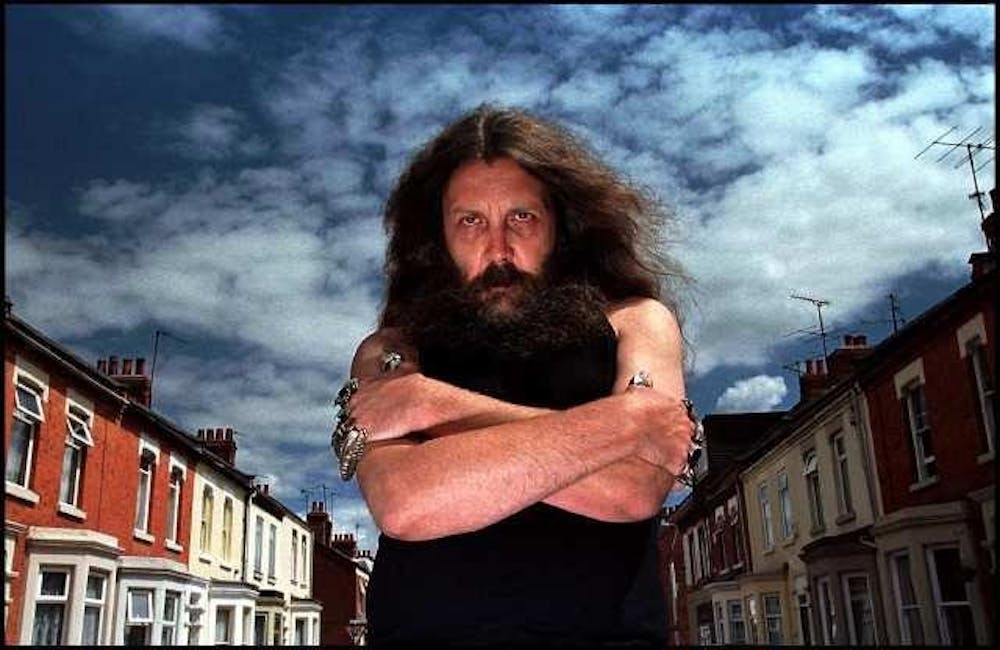Welcome, true believers and newcomers alike, to the first edition of WEEKEND Comics Talk. This edition will introduce and explore the works of a half dozen of the finest comics writers in the universe, and close with a list of titles that will be available in comic book stores across the country this week.
But first, a few disclaimers: with anything that comes down to taste, biases are going to be present. You won’t read about anything Japanese in this weekly feature, nor will you read about very much from before the 1980s comics explosion except in a historical context. Still, I very much want this to be a public forum for the discussion of comics, so heated debate is strongly encouraged, and emails regarding what readers would like to see in future editions are always appreciated. So, without further ado, here are six men who have consistently taken the comic book narrative to its limits in their work and who any newcomer would do well to study.
Alan Moore: No one in the history of comic books is more iconoclastic or eccentric than this Englishman, but none are more revered or influential either. After his fairly pedestrian introduction to the world of mainstream comics with 1982’s "Marvelman" (retitled "Miracleman" stateside) he quickly ascended to unprecedented levels, with his output from 1985 to 1988 still considered some of the greatest of all time. He has reinvented himself and now has his own line of comics called America’s Best which grants him freedom that he felt he lacked working with DC and Marvel. Moore will probably never totally recapture what made those 80s works so fantastic, but he still writes at a relatively high level and has had the most remarkable career of anyone in comics history aside from Stan Lee.
Shining moment: "Watchmen"
Darkest hour: "Lost Girls"
Brian K. Vaughan: At thirty-three years of age, this Cleveland-native wunderkind is probably the youngest person in comics history to attain what he has attained (Again, aside from Stan Lee. More on him in a later edition). Non-comics aficionados are probably familiar with Vaughan from his work as a writer on "Lost" from seasons three to five, but in the humble opinion of this writer, his true greatness pours out of his inventive approach to comic books. His body of work is still limited, but he has spent the last decade churning out instant classic after instant classic, and it’s not impossible to think that he could eventually be called the greatest of all time.
Shining moment: "Ex Machina"
Darkest hour: "Runaways"
Mark Millar: The central figure in a very strong modern comics movement coming out of Scotland, Millar is the absolute king of the what-if motif. Most of his best work has come out of DC or Marvel asking him to reinvent beloved characters or totally change the face of the universe he’s operating within. He has given us a communist Superman, a civil war fought by forces led by Iron Man and Captain America, and an entirely new universe of Marvel characters where Tony Stark is terminally ill and Nick Fury looks like Samuel L. Jackson. If you want your universe reinvented, just give it to Mark Millar and watch the genius unfold.
Shining moment: "The Ultimates"
Darkest hour: "Kick-Ass"
Brian Azzarello: Another Clevelander, Brian Azzarello rose to prominence on the strength of one of the most ambitious finite runs of all time in his 100-issue "100 Bullets" series. It wasn’t totally consistent but it more than made up for that with its massive scope and its exciting, morally ambiguous antiheroes. Azzarello continued this obsession with imperfect protagonists with brilliant treatments of both Lex Luthor and the Joker, and his work is universally respected by contemporaries, most of whom probably wish they had the patience to do a hundred issues of anything.
Shining moment: "100 Bullets"
Darkest hour: "Filthy Rich"
Grant Morrison: Perhaps this Scot’s uncanny resemblance to Lex Luthor is what makes him such a fantastic comic book writer, but I doubt it. More likely, it’s his unbelievable knack for letting words do the writing where they need to and stepping aside to let his artists flesh out his stories the rest of the time. Take the first page of "All-Star Superman" #1, for example: the only words to be found are “Doomed planet. Desperate scientists. Last hope. Kindly couple.” Just like that, a thousand words of Superman origin story are condensed into eight and the story is allowed to unfold. It’s with this approach to narrative that Morrison has ascended to such great heights as a writer and has earned the undying respect of the critics, fans and colleagues alike.
Shining Moment: "All-Star Superman"
Darkest hour: "Fantastic Four: 1234"
Ed Brubaker: There is probably no one with a greater reverence for the history of the characters he writes about than Maryland’s Ed Brubaker. In his brilliant "Captain America" #600, a section at the back of the book reproduced the covers of the first 599 issues of the run, and that was the perfect metaphor for what Brubaker is all about. When he takes on a new assignment, he also takes on the sixty-plus years that precede it, and in turn, the writing always shines.
Shining moment: "The Death of Captain America"
Darkest hour: "X-Men: Deadly Genesis"
Selected new releases available this week:
Daredevil #504
Fall of the Hulks: Red Hulk #1
Fantastic Four #575
Thor #606
Detective Comics #861
Teen Titans #79
Superman #696
Victorian Undead #3
Wildcats #19
Jack of Fables #42
Unknown Soldier #16
Predator #4
Comic Talk #1: Meet the Writers

Get stories like this in your inbox
Subscribe





